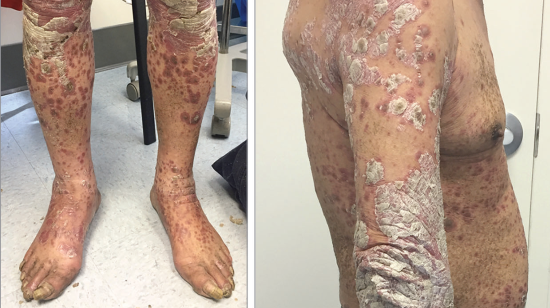G.R. is a 55-year-old white obese male brought to the hospital by his wife. The chief complaint of this patient is erythema, scaling, and skin thickening on his torso and extremities several months ago after a mild upper-respiratory tract infection. G.R. is afraid that he may have developed the same problem his father had, but he is unsure about the exact diagnosis because his parents divorced when he was nine. The patient is a warehouse manager in a biotechnology company, where he has been working for the last twenty years. G.R. denies smoking, but he admits occasional alcohol use two or three times per month.

The patient interview revealed that he was diagnosed with type 2 diabetes and hypertension five years ago. He takes 500 mg of Metformin for the former and 500 mg of Chlorothiazide for the latter. He did not have any surgical procedures in the past, and all his immunizations were up to date. Physical examination showed multiple salmon-colored plaques with scaling on knees, elbows, chest, and back (Figure 1). According to the patient, there was mild bleeding when he tried to remove adherent scales. The differentials included atopic dermatitis, reactive arthritis, and seborrheic dermatitis. However, the final clinical diagnosis was Psoriasis Vulgaris, based on physical examination and patient history.
Psoriasis is a chronic inflammatory skin disease with multiple causative factors. Having parents with psoriasis is considered the leading risk factor for developing this disorder (Griffiths et al. 1303). The environmental triggers are smoking, alcohol use, obesity, and metabolic syndrome (Griffiths et al. 1304). It appears that G.R. had several of these risk factors, including genetics, alcohol use, significant weight issues, and an insulin-resistant state.
The diagnosis of psoriasis is primarily made based on clinical presentation; thus, no skin biopsy was recommended. All laboratory tests for inflammation markers were within normal range. The recommended treatment for psoriatic patients includes topical steroids in mild cases, but, in moderate to severe cases, the therapy requires immunosuppressive biologics and phototherapy (Armstrong and Read 1950). Since G.R. presented with extreme scaling, weekly injections of 20 mg of Methotrexate with folic acid and U.V. therapy were prescribed to him. Since the recommended therapy is hepatotoxic and may cause bone marrow suppression, he should abstain from alcohol. Lastly, he was instructed to avoid going to crowded places without personal protective wearing to avoid contracting airborne infections.
Works Cited
Armstrong, April W., and Charlotte Read. “Pathophysiology, Clinical Presentation, and Treatment of Psoriasis: A Review.” Jama, vol. 323, no. 19, 2020, pp. 1945-1960.
Griffiths, Christopher EM, et al. “Psoriasis.” The Lancet, vol. 397, no.10281, 2021, pp. 1301-1315.